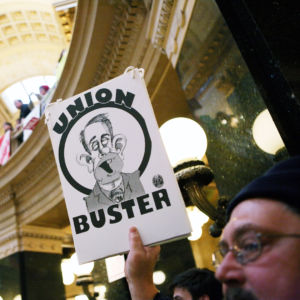A worker choice advocacy group on Wednesday defended Wisconsin against a union lawsuit seeking to stop a recently enacted right-to-work law.
Republican Gov. Scott Walker signed the right-to-work bill into law last year after a tense legislative battle. The policy outlaws mandatory union dues or fees as a condition of employment. The National Right to Work Foundation (NRTW) submitted a legal opinion on behalf of five workers in the state defending the policy against a union lawsuit.
“[The] law provides a simple but essential protection for Wisconsin employees by protecting freedom of choice when it comes to union membership and payment of dues and fees,” NRTW President Mark Mix said in a statement provided to InsideSources.
The Wisconsin AFL-CIO, Machinists Local Lodge 1061 and United Steelworkers District 2 claim in their lawsuit the law is unconstitutional. Right-to-work laws in multiple states have faced numerous lawsuits over the decades but have been upheld over the years as a federal protected states right under the 1947 Taft-Hartley Act.
“Instead of spending so much time fighting worker freedom in court, Wisconsin union officials ought to reflect on why they are so concerned that the very workers they claim to represent will not voluntarily support them when given a free choice,” Mix went onto say.
Nevertheless the unions argue right-to-work should be deemed unconstitutional because it forces them to represent workers without just compensation. Unions that get voted in as the exclusive representative for a workplace are required by law to represent all workers regardless of whether they pay dues or not.
Right-to-work supporters argue its not about hurting unions but about providing workers a choice. Many simply don’t want workplace representation or the benefits the union fights for. States that have right-to-work policies might also attract businesses because employers don’t have to deal with union interference or expenses.
Unions have long voiced distrust for Walker because of his support for a 2011 labor reform bill known as Act 10. The law allowed state employees to choose whether they wanted to pay union dues. It also required public unions to hold a renewal vote every couple of years to determine if workers still wanted them.
Labor unions held numerous protests against Walker in response to both measures. Walker was faced with more resistance from national unions when he ran in the most recent Republican presidential primary.
The Wisconsin AFL-CIO, Machinists and United Steelworkers did not respond to a request for comment by InsideSources.

